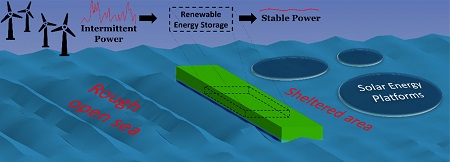
Register with Plumtri!
Register on plumtri as an Individual or as an Organisation to gain access to all of its useful features and remain updated on the latest R&I news, events and funding opportunities.
-
 Welcome to plumtriA platform for Research & Innovation
Welcome to plumtriA platform for Research & Innovation -
 Looking for Funding?Check out the current open calls
Looking for Funding?Check out the current open calls -
 Register today to start receiving our monthly newsletter
Register today to start receiving our monthly newsletter -
 Looking to partner up?Search our list of registered profiles
Looking to partner up?Search our list of registered profiles -
 You have questions on a particular funding programme?
You have questions on a particular funding programme?
Project: FORTRESS - A Floating OffshoRe BreakwaTer for Supporting Marine Renewable Energy around ISlandS

University of Malta developing a novel Floating Breakwater Design to support Offshore Renewables in the Maltese Waters.
Malta has often been called a 'Fortress Island' given the significant presence of fortifications that have been constructed by the Knights of St. John and during the British period. Such developments had been driven by the need to protect Malta, located in such a strategically important location in the Mediterranean, from possible invasion.
The urgent need to reduce our reliance on fossil fuels for our energy needs by investing in offshore renewables will demand our densely populated island to invest in other types of protection in decades to come. This time, the defenses will have to be located at sea to protect renewable energy devices, such as floating photovoltaic panels, from waves in stormy conditions.
This vision is being evaluated through the research project FORTRESS (A Floating OffshoRe BreakwaTer for Supporting Marine Renewable Energy around ISlandS). The project is currently being undertaken by the University of Malta’s Department of Mechanical Engineering and Institute for Sustainable Energy, and is receiving financial support from the Energy and Water Agency. The FORTRESS team is looking into an innovative floating breakwater design that can be deployed in deep waters to attenuate large waves and create sheltered areas at coastal sites. The novel design of the wave breaker will avoid the need for bulky floating structures for supporting large-scale floating solar panels in the open sea. Consequently, the proposed technology could also drive down investment risks faced by renewable energy developers.
The research is being carried out by Charise Cutajar, Andrew Borg, Tonio Sant, Robert N. Farrugia, Daniel Buhagiar and Kurt Spiteri. The floating breakwater design is modular, with each module scaled down to be able to be manufactured in local docks. The project would therefore also benefit the Maltese construction and maritime industries by providing opportunities to diversify and expand activities into the offshore renewable energy sector.
Apart from being designed to mitigate harsh wave action, the novel breakwater will integrate a long duration energy storage (LDES) technology. The LDES is aimed to convert intermittent power generated by nearby floating solar and wind farms into a stable supply of power. A hydro-pneumatic energy storage (HPES) technology tailored for offshore use is being considered. This technology is currently being developed in collaboration with the startup company FLASC B.V. The storage solution will also be able to provide charging facilities for electrically-powered sea faring vessels seeking to be charged via renewable energy. Extensive computer simulations and lab experiments on floating breakwater scaled models have so far been encouraging, demonstrating the effectiveness of the modular structure in calming rough waves and in supporting a substantial energy storage capacity to provide a secure supply of renewable energy. For further information about the FORTRESS project contact Professor Tonio Sant via email.
Project FORTRESS is financed by the Energy and Water Agency under the National Strategy for Research and Innovation in Energy and Water (2021-2030).
